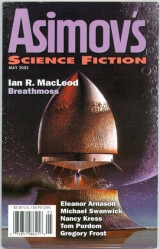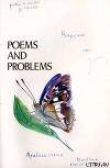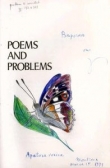
Текст книги "Knapsack Poems"
Автор книги: Eleanor Arnason
Жанр:
Научная фантастика
сообщить о нарушении
Текущая страница: 2 (всего у книги 2 страниц)
"I owe the child a debt of gratitude," said my best scout firmly. "Without her, I would have had pain and humiliation, when the lord–a kind of lunatic–unrolled my testes, as she clearly planned to do. At best, I would have limped away from the keep in pain. At worst, I might have ended in the lord’s treadmill, raising water from the depths to make her comfortable."
"The question is a good one," said my scribe. "How can a person who is only one sex avoid becoming a monster? The best combination is the one I have: male, female, and both kinds of neuter. But even two sexes provide a balance."
"Other people–besides these three–have consisted of one sex," my scout said stubbornly. "Not all became monsters. It isn’t sex that has influenced these lords, but the stony fields and spiny mountains of Ibri, the land’s cold winters and ferocious wildlife. My various parts can teach the child my different qualities: the valor of the cudgel-carriers, the coolness of poet and scribe, the female tenderness that the rest of me has. Then she will become a single harmony."
The scout paused. The rest of me looked dubious. The scout continued.
"Many people lose parts of themselves through illness, accident, and war; and some of these live for years in a reduced condition. Yes, it’s sad and disturbing, but it can’t be called unnatural. Consider aging and the end of life. The old die body by body, till a single body remains. Granted, in many cases, the final body dies quickly. But not always. Every town of good size has a Gram or Gaffer who hobbles around in a single self.
"I will not give up an infant I have nursed with my own milk. Do I wish to be known as ungrateful or callous? I, who have pinned all my hope on honor and fame?"
I looked at myself with uncertain expressions. The wishikshook down more snow.
"Well, then," said my poet, who began to look preoccupied. Another poem coming, most likely. "I will take the child to a crèche and leave her there."
My scout scowled. "How well will she be cared for there, among healthy children, by tenders who are almost certain to be prejudiced against a mite so partial and incomplete? I will not give her up."
"Think of how much I travel," a cudgel-carrier said. "How can I take a child on my journeys?"
"Carefully and tenderly," the scout replied. "The way my ancestors who were nomads did. Remember the old stories! When they traveled, they took everything, even the washing pot. Surely their children were not left behind."
"I have bonded excessively to this child," said my scribe to the scout.
"Yes, I have. It’s done and can’t be undone. I love her soft baby-down, her four blue eyes, her feisty spirit. I will not give her up."
I conversed this way for some time. I didn’t become angry at myself, maybe because I had been through so much danger recently. There is nothing like serious fear to put life into perspective. Now and then, when the conversation became especially difficult, a part of me got up and went into the darkness to kick the snow or to piss. When the part came back, he or she or it seemed better.
Finally I came to an agreement. I would keep the child and carry it on my journeys, though half of me remained unhappy with this decision.
How difficult it is to be of two minds! Still, it happens; and all but the insane survive such divisions. Only they forget the essential unity that underlies differences of opinion. Only they begin to believe in individuality.
The next morning, I continued into Ib.
***
The poem I composed for the lord of the warm keep became famous. Its form, known as "ringing praise," was taken up by other poets. From it, I gained some fame, enough to quiet my envy; and the fame led to some money, which provided for my later years.
Did I ever return to Ibri? No. The land was too bitter and dangerous; and I didn’t want to meet the lord of the warm keep a second time. Instead, I settled in Lesser Ib, buying a house on a bank of a river named It-Could-Be-Worse. This turned out to be an auspicious name. The house was cozy and my neighbors pleasant. The child played in my fenced-in garden, tended by my female parts. As for my neighbors, they watched with interest and refrained from mentioning the child’s obvious disability.
"Lip-presser on one side.
Tongue-biter on t’other.
Happy I live,
Praising good neighbors."
I traveled less than previously, because of the child and increasing age. But I did make the festivals in Greater and Lesser Ib. This was easy traveling on level roads across wide plains. The Ibian lords, though sometimes eccentric, were nowhere near as crazy as the ones in Ibri and no danger to me or other poets. At one of the festivals, I met the famous plumber, who turned out to be a large and handsome, male and neuter goxhat. I won the festival crown for poetry, and he/it won the crown for ingenuity. Celebrating with egg wine, we became amorous and fell into each other’s many arms.
It was a fine romance and ended without regret, as did all my other romances. As a group, we goxhat are happiest with ourselves. In addition, I could not forget the prisoners in the treadmill. Whether the plumber planned it or not, he/it had caused pain for others. Surely it was wrong–unjust–for some to toil in darkness, so that others had a warm bed and hot water from a pipe?
I have to say, at times I dreamed of that keep: the warm halls, the pipes of water, the heated bathing pool and the defecating throne that had–have I forgotten to mention this?–a padded seat.
"Better to be here
In my cozy cottage.
Some comforts"
Have too high a cost.
I never laid any fertile eggs. My only child is Ap the Foundling, who is also known as Ap of One Body and Ap the Many-talented. As the last nickname suggests, the mite turned out well.
As for me, I became known as The Clanger and The Wishit,because of my famous rhyming poem. Other names were given to me as well: The Child Collector, The Nurturer, and The Poet Who Is Odd.








